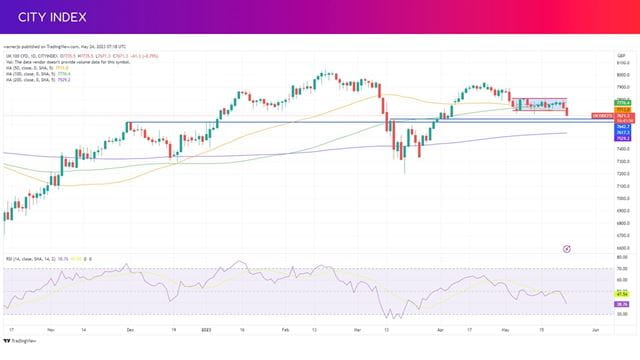
FTSE 100 analysis
The FTSE 100 is down 0.8% this morning, with the index set to open at 7,702.8.
Turning to the UK 100 chart, we can see it is testing its lowest level in almost seven weeks. It has slipped out of the range that has held the index since early May. Closing at this level could provide a new bearish signal for markets. That could open the door for a move back toward 7,644. A drop below here could see the ceiling seen in November and December of 7,614 come back into play.
The immediate job is to reclaim the ground lost this morning and to recover back into the range, which would require a close above 7,710.

UK inflation comes in hot
That is in response to news out this morning that UK inflation eased last month, although not as much as hoped. The Consumer Price Index (CPI) slowed to 8.7% in April from the 10.1% we saw in March, coming in hotter than the 8.2% forecast.
That is the first time that inflation has fallen to single digits in eight months, but it is also the third month in a row that inflation has come in higher than expected, which could entrench expectations that the Bank of England will need to keep raising interest rates. That is cementing the view that the Bank of England will raise interest rates at its next meeting and dashing any hopes of a pause in the near future.
Top UK stock news
Ocado Group is down 1.4% after news it could lose its position in the FTSE 100 following a sharp drop in its market cap, according to indicative results of the quarterly FTSE review posted yesterday. We could see it replaced by engineer IMI if the situation stays the same by the time the changes become effective at the end of this month. The review also said Capricorn Energy, Hunting, Molten Ventures, Tullow Oil and Vivendum could be pushed out of the FTSE 250 and replaced by Capita, Empiric Student Property, Gore Street Energy Storage Fund, Me Group International and Tyman.
Marks & Spencer Group is up 6.7% and at its highest level since February 2022 after it beat expectations in the year to the start of April thanks to stronger demand for both food and clothing and said it plans to restore dividends with an interim payout in the new financial year. Sales rose 9.9% to £11.98 billion to beat the £11.79 billion forecast. Adjusted pretax profit declined 7.8% to £482 million, but this was much better than the £429.1 million forecast. M&S said sales have continued to grow in the new financial year and said revenue should experience ‘modest’ growth. It said cost-savings will be countered by higher expenses on energy and wages.
Kingfisher is down 2.4% after it said first quarter like-for-like sales dropped 3.3% as demand for seasonal goods was hit by a late start to spring, although total sales edged-up 0.8% to £3.3 billion. Both numbers met analyst expectations. The DIY and home improvement retailer said LfL seasonal goods sales were down 11.3% but that LfLs for core products and big ticket items proved more resilient after experiencing a 1.3% drop. It said trading had improved since early April. It reiterated its full year guidance to meet consensus for adjusted pretax profit of £634 million, down from the £758 million we saw in 2022.
Aviva is down 3% and falling from one-month highs after it said its insurance, wealth and retirement arms all experienced strong growth in the first quarter while controllable costs declined, with the company stating it is ‘uniquely placed to successfully navigate the prevailing economic environment, with its strong leadership positions and diversified product set.’ Protection and health insurance sales were up 11% in the first quarter, retirement annuities and equity release sales were up 17%, general gross written insurance premiums increased 11% and wealth net flows notched up 6% from the year before. It remains on track to cut costs by £750 million by 2024 and said its dividend guidance remains unchanged.
Intertek Group is up 1.9% and at 12-week highs after it said revenue rose 11.4% year-on-year in the first four months of 2023 to £1.06 billion. Like-for-likes increased 6.5%. The firm said the performance was down to stronger demand for its ATIC services and a broad-based geographic recovery, including a rebound in China. It reiterated its full year ambition to deliver mid-single digit LfL growth and an improvement in margin.
SSE is up 1.6% after it said adjusted EPS jumped 75% in the year to the end of March to 166p but warned this will fall closer to 150p in the new financial year. While guiding for lower profits, the outlook for this year was ahead of the 143p forecast. The company said it spent a record £2.8 billion on capex and investment on low-carbon electricity projects and said this will rise even further this year. As a result, SSE’s reported loss per share at the bottom-line of 14.7p turned from a 241.2p profit the year before. It also said its dividend for the year will be 96.7p, but warned this has been rebased to just 60p for the current financial year with the ambition of growing it 5% to 10% per year going forward.
Citigroup has put a 30-day downside catalyst watch on Royal Dutch Shell, which is down 0.4% this morning, ahead of the oil company’s capital markets day, with analyst Alastair Syme stating profitability is deteriorating and highlighting Shell is facing pressure about underinvestment in its core upstream business.
How to trade the FTSE 100
You can trade the FTSE 100 with City Index in just four easy steps:
- Open a City Index account, or log-in if you’re already a customer.
- Search for ‘FTSE 100’ you want in our award-winning platform
- Choose your position and size, and your stop and limit levels
- Place the trade
Or you can practice trading risk-free by signing up for our Demo Trading Account.










